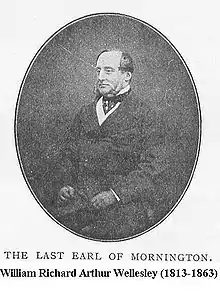William Pole-Tylney-Long-Wellesley, 5th Earl of Mornington
William Richard Arthur Pole-Tylney-Long-Wellesley, 5th Earl of Mornington (7 October 1813 – 25 July 1863) was a British nobleman.

.jpg.webp)
Long-Wellesley, the son of the notorious spendthrift William Pole-Tylney-Long-Wellesley (later fourth Earl of Mornington) and Catherine Tylney-Long (daughter of Sir James Tylney-Long, 7th Baronet), was born on 7 October 1813 at Wanstead House, at that time in Essex, but within the London borough of Redbridge since 1965.
His father's spending wreaked havoc on the family estate, but upon his mother's death in 1825, he inherited the remaining estates at Wanstead; Athelhampton, Devon; and Draycot Cerne, Wiltshire. Bitter, protracted custody litigation followed — his mother's sisters with temporary custody succeeded in placing him under the guardianship of the Duke of Wellington, his great-uncle.
In 1836 he took his father to court, after his father had sold furniture and pictures belonging to Draycot House to cover a £3,000 debt. These were passed out of a window after the sales agent was refused admission to the house. William junior maintained that these items belonged to him as heirlooms by the will of Sir James Long, 2nd Baronet.[1]
His father succeeded as Earl of Mornington in 1845, after which William was styled Viscount Wellesley. In 1848, despite opposition from his father, he sold Athelhampton which had been purchased by Sir Robert Long, 1st Baronet, in 1665. He succeeded his father as Earl of Mornington on 1 July 1857.
Mornington died unmarried in Paris on 25 July 1863 from cancer of the tongue, and is buried at Draycot Cerne in Wiltshire. Having originally made his will bequeathing all his estates to his only sister Lady Victoria (who died unmarried in 1897), he made another will three weeks before his death, leaving all his landed property to his father's cousin Earl Cowley, then ambassador at Paris. In dismay, Lady Victoria wrote to her cousin Walter Long of Rood Ashton House: 'my wish would have been that after our own immediate heirs, all Long property should have returned to your family as the elder branch'.
He was succeeded as sixth Earl of Mornington by his cousin, the second Duke of Wellington.
References
- The Times 2 May 1836; Issue 16092